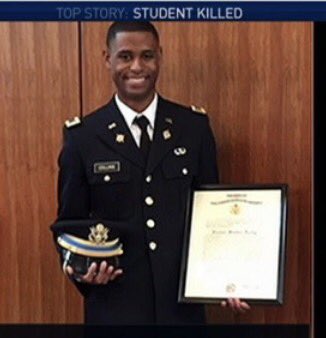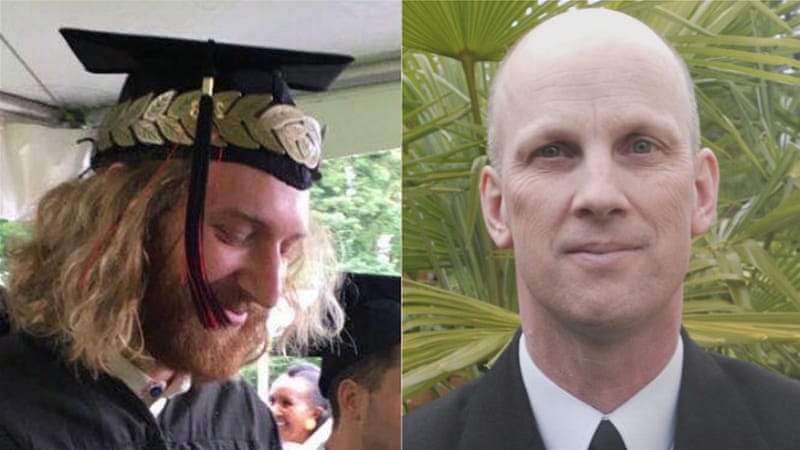:ALERTRED::ALERTRED::ALERTRED:
Trump won't condemn white supremacists or Vladimir Putin — and the 2 are closely linked
Natasha Bertrand
A billboard showing a pictures of then-president elect Donald Trump and Russian President Vladimir Putin is seen through pedestrians in Danilovgrad, Montenegro, November 16, 2016. Reuters/Stevo Vasiljevic
- Trump's refusal to unambiguously condemn white supremacists who organized the Charlottesville rally reminded many of his reluctance to criticize Putin.
- Both Trump and his nationalistic base have found a natural ally in Russia's current zeitgeist, which perceives the US as a globalist, imperialist power working on behalf of liberal elites.
- White supremacy — manifested frequently as anti-Semitism — is inextricably linked to the worldview of many alt-right admirers of Putin's Russia.
President Donald Trump has faced heavy criticism for denouncing violence "on all sides" rather than explicitly condemning white supremacism in the wake of last weekend's deadly rallies in Charlottesville, Virginia.
"We condemn in the strongest possible terms this egregious display of hatred, bigotry, and violence on many sides," Trump said at a press conference on Saturday. "On many sides."
The comments
were celebrated by neo-Nazis and white supremacists, who rejoiced in the president's refusal to call them out by name.
"He refused to even mention anything to do with us," wrote Andrew Anglin, founder of the neo-Nazi and white supremacist website Daily Stormer. "When reporters were screaming at him about White Nationalism he just walked out of the room."
Trump's refusal to unambiguously condemn the white supremacists who organized and marched at Friday's "Unite The Right" rally, which continued into Saturday, reminded many of his reluctance to criticize Russian President Vladimir Putin.
"Your 5000th reminder,"
tweeted Republican strategist and fierce Trump critic Rick Wilson. "Donald Trump will go to Twitter war with anyone who displeases him. Except Putin, Nazis, and white-supremacists."
Trump's bromance with Putin reached new heights last week when he
thanked the Russian leader for ordering cuts to the US embassy's staff in Moscow. But his flirtations with Putin, as with the white nationalists who form a core part of his base, predate his rise to the presidency.
Whether Trump feels an ideological connection to Putinisim or white nationalism — which are closely linked — is not totally clear. Just as Putin has used nationalism and a return to "traditional values" to consolidate power, Trump may have fanned the flames of xenophobia before and during his campaign to rile a predominantly white base that was already susceptible to racist rhetoric and a hatred of globalization.
In the US, the rise of the alt-right as a crusade against establishment politics coincided with Trump's political ascendance and was aided heavily by far-right news outlets like Breitbart, which was called "a platform for the alt-right" by Trump's chief strategist (and former Breitbart CEO) Steve Bannon.
Both Trump and his nationalistic base, however, appear to have found a natural ally in Russia's current zeitgeist, which perceives the US as a globalist, imperalist power working on behalf of liberal elites.
"Objectively, Trump's behavior mirrors Putin's behavior," Robert Amsterdam, an American lawyer who was once detained by Putin and formerly represented Russian oligarch Mikhail Khodorkovsky, said in an interview earlier this year. "The substantive areas of agreement between Putin and Trump, and between Bannon and Putin's aides, are really significant."
'Putin is supporting nationalists around the world'
White supremacy — manifested frequently as anti-Semitism — is inextricably linked to the worldview of many alt-right admirers of Putin's Russia.
David Duke, the former grand wizard of the Ku Klux Klan who told reporters on Saturday that white-nationalist protesters were working to "fulfill the promises of Donald Trump," has traveled to Russia several times to promote his book "The Ultimate Supremacism: My Awakening on the Jewish Question."
The book has been sold openly in the main lobby of the State Duma (Congress) for the equivalent of about $2.
White supremacist Matthew Heimbach, who said he identifies as a member of the alt-right, told Business Insider in
an interview late last year that "Putin is supporting nationalists around the world and building an anti-globalist alliance, while promoting traditional values and self-determination."
"I really believe that Russia is the leader of the free world right now," added Heimbach,who was slated to speak at the "Unite The Right" rally.
Heimbach, whose Traditionalist Workers Party was deemed an extremist group by the
Southern Poverty Law Center, pushed back against claims that he is anti-Semitic. But he said he believes "the organized Jewish community" is heavily involved in "supporting movements that want to destroy nationalism."
He also described the US' current foreign policy as aggressive and imperialistic, and criticized NATO's military buildup in eastern Europe as an example of how the US is trying to promote a "global conflict" with Russia.
Trump, too, has warned that a hawkish Congress has forced the US' relationship with Russia to an "all-time and very dangerous low." He also criticized NATO, calling it "obsolete," and was slammed by Jewish organizations across the country for
failing to mention Jews in a statement commemorating Holocaust Remembrance Day.
Russian President Vladimir Putin and US President Donald Trump AP
For Heimbach, Putin's brand of orthodoxy, which opposes same-sex marriage, abortion, and globalism, "is the last institution standing for traditional values." And he's happy to see Putin working hard to export those values, even if that may be perceived as meddlesome and globalist in its own right.
Trump has hardly been a crusader for traditional social values. But he has never condemned Putin's many human rights abuses, at one point going as far as to tell former Fox News host Bill O'Reilly that the United States "kill
people, too."
Alt-right leader Richard Spencer, the head of the white nationalist think tank the National Policy Institute, has similarly argued that the US should dispense with its globalist policies by pulling out of NATO and resetting its relationship with Russia. Spencer helped organize last weekend's white nationalist protests.
Kevin MacDonald, who gave a speech at Spencer's NPI in late November about how "Jews remade America in their interests ... to make white America comfortable with massive non-white immigration and its own dispossession," has written that the "demonization of Russia in Western media and political circles" is a Jewish campaign to undermine Putin.
Preston Wiginton, a white supremacist from Texas who sublets Duke's Moscow apartment when he travels to Russia, has written that his "best friends" in Russia — "the only nation that understands RAHOWA [Racial Holy War]" — are "leading skinheads."
Spencer's ties to Russia, which he has called the "sole white power in the world," go deeper. He was married until October to Russian writer and self-proclaimed "Kremlin troll leader" Nina Kouprianova, whose writing under the pen name Nina Byzantina regularly aligns with Kremlin talking points.
The webzine Spencer founded in 2010 called Alternative Right accepted contributor pieces from Aleksandr Dugin, the far-right, ultra-nationalist politician who encouraged Putin's incursion into Ukraine and whose work has been translated into English by Byzantina on her blog. (It does have a caveat: "The views of the original author do not necessarily reflect those of the translator.")
Dugin also recorded a speech titled "To My American Friends in Our Common Struggle" for a nationalist conference organized by Heimbach last year in California, and has been a guest on InfoWars, a far-right radio show hosted by conspiracy theorist Alex Jones.
"Your reputation's amazing," Trump told Jones when he was a guest on InfoWars in December 2015. "I will not let you down."









